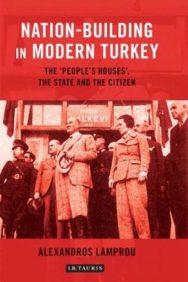
ABOUT THIS BOOK
PUBLISHER: I.B.Tauris & Co. Ltd.
FORMAT: Paperback
ISBN: 9781788313940
RRP: £25.00
PAGES: 320
PUBLICATION DATE:
August 30, 2018
BUY THIS BOOK
As an Amazon Associate and Bookshop.org affiliate we earn from qualifying purchases.
Nation-Building in Modern Turkey: The “People’s Houses”, the State and the Citizen
Alexandros Lamprou
From 1924 to 1946 the Republic of Turkey was in effect ruled as an authoritarian single-party regime. During these years the state embarked upon an extensive reform programme of modernisation and nation-building. Alexandros Lamprou here offers an alternative understanding of social change and state-society relations in Turkey, shifting the focus from the state as the prime instigator of change to the population’s participation in the process of reform. Through the study of the ‘People’s Houses’, the community centres opened and operated by the Republican People’s Party in most cities and towns of Turkey, and using previously unpublished archival material, Lamprou analyses how ordinary people experienced, negotiated and resisted the reforms in the 1930s and 1940s and how this process contributed to the shaping of social identities. This book will be essential reading for students and scholars of nation-building, socio-cultural change and state-society relations in modern Turkey.
Reviews of Nation-Building in Modern Turkey: The “People’s Houses”, the State and the Citizen
`Alex Lamprou's study of the People's Houses is important and innovative in that it does not limit itself to the cultural policies of the Turkish republic as formulated in the centre, but rather looks at the way the cultural and ideological clubs of Ataturk's People's Party functioned in their local environment. Lamprou shows that the People's Houses were not simply instruments to spread the message of party or state, and that control over them was often contested between the representatives of the state, the party and local elites. It is part of the new wave of Turkish historiography that privileges local case studies to bring to life the realities of Turkey in the first decades of the republic.' – Erik J. Zurcher, Professor of Turkish Studies, University of Leiden and author of Turkey: A Modern History
Alexandros Lamprou
Alexandros Lamprou teaches in the Faculty of Languages, History and Geography, Ankara University. He has formerly taught at University of Crete and holds a PhD from the University of Leiden.









